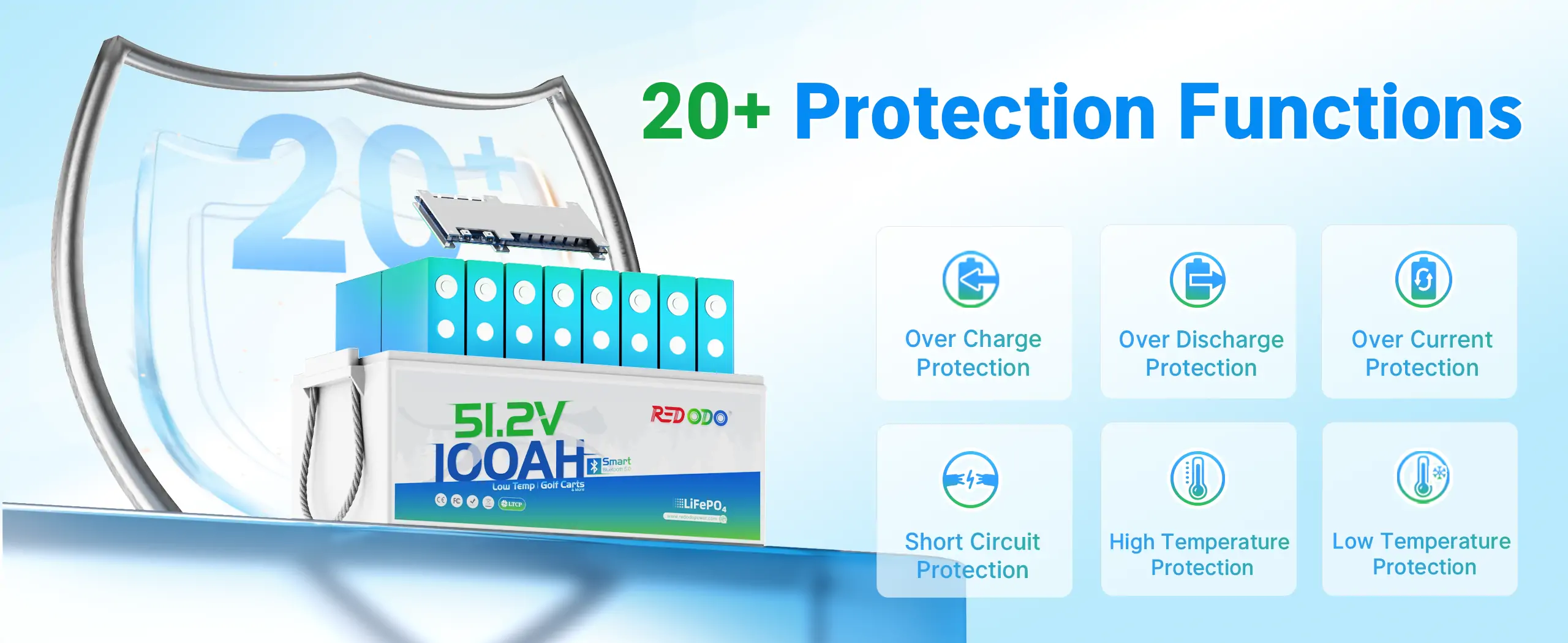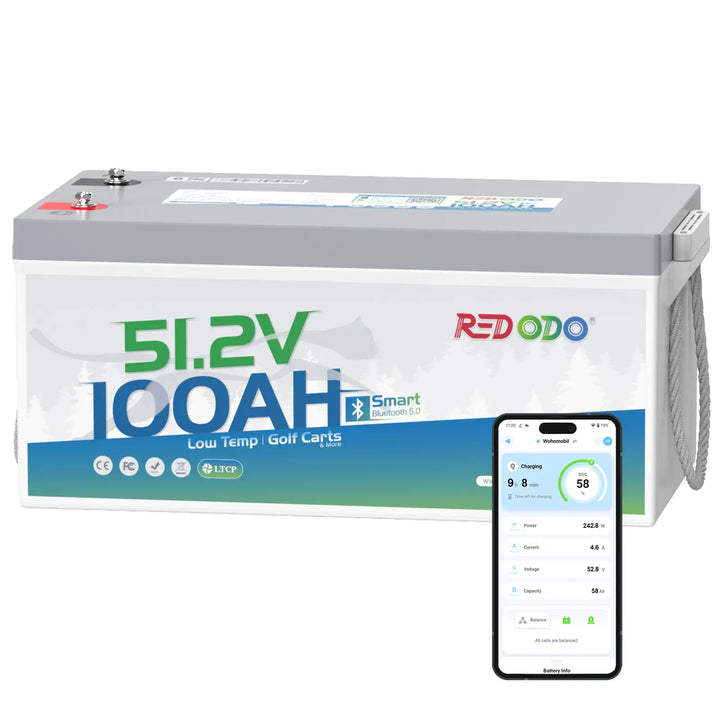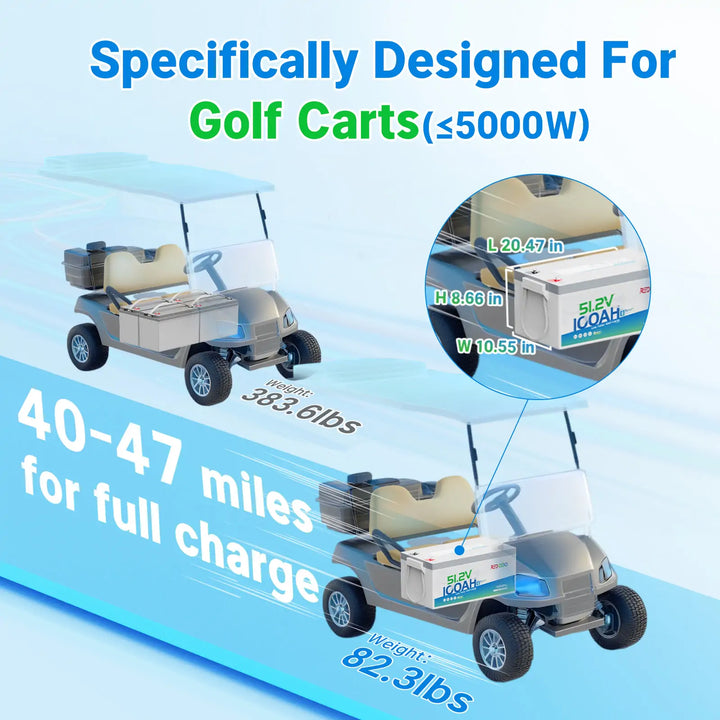If you’re wondering about the difference between 48V and 51.2V golf cart batteries, here’s the short answer: the key difference lies in their battery types and voltage levels, which impact power output, compatibility, and efficiency.
While both can power your golf cart effectively, 51.2V batteries, often LiFePO4 (lithium iron phosphate), provide better energy efficiency, longer lifespan, and lighter weight compared to traditional 48V lead-acid batteries. In this article, we’ll explore these differences and help you choose the right golf cart battery for your needs.
Table of Content
What Are 48V and 51.2V Golf Cart Batteries?
48V Golf Cart Batteries
A 48V battery system typically uses lead-acid or AGM (Absorbed Glass Mat) batteries. This voltage has been the standard for many golf carts due to its ability to provide sufficient power for most recreational needs.
- Voltage Range: A standard 48V battery pack operates within 42V to 50V during use.
- Battery Chemistry: Most 48V systems use lead-acid batteries, which are affordable but have limited efficiency and shorter lifespans.
- Applications: Ideal for traditional golf carts on flat terrains or short distances.
51.2V Golf Cart Batteries
The 51.2V systems are generally lithium-based, specifically using LiFePO4 cells. These batteries are becoming increasingly popular due to their superior performance and longevity.
- Voltage Range: A 51.2V battery operates within 48V to 54V.
- Battery Chemistry: They use advanced LiFePO4 technology, offering higher energy density and stability.
- Applications: Perfect for modern golf carts that require enhanced performance, long-distance capabilities, and reliability.
Comparison Between 48V and 51.2V Golf Cart Batteries
Here are the full performance comparison between 48V and 51.2V Golf Cart Batteries:
1. Power Output
- 48V Batteries: Deliver a standard level of power, making them suitable for most golf carts. They provide sufficient torque and speed for typical golf course terrain and everyday use.
- 51.2V Batteries: Offer higher power output than 48V batteries. The increased voltage enhances performance, allowing for faster acceleration, higher speeds, and improved hill-climbing capabilities.
2. Efficiency
- 48V Batteries: Efficient for standard applications, though performance may decline over time. While reliable in energy delivery, they have lower energy density compared to newer technologies.
- 51.2V Batteries: Typically utilize advanced lithium-ion technology, providing higher efficiency and more consistent power output. They maintain performance better with higher energy density and experience fewer energy losses than older battery types.
3. Acceleration and Speed
- 48V Batteries: Offer adequate acceleration and top speed for everyday golf cart use, making them suitable for casual driving and standard golf course conditions.
- 51.2V Batteries: Provide better acceleration and higher top speeds, with enhanced power output resulting in quicker starts and a more responsive driving experience.
4. Battery Life
- 48V Batteries: Deliver reliable performance but tend to have a shorter lifespan of 2-3 years. They also require more frequent maintenance and replacement.
- 51.2V Batteries: Known for their longer lifespans of over 5 years and superior durability due to advanced lithium-ion technology. They typically require less maintenance and experience a slower rate of capacity decline over time.
5. Weight
- 48V Batteries: Generally heavier due to the greater number of lead-acid cells (for example, 6*8V lead-acid battery sets), which can impact the cart’s handling and overall performance.
- 51.2V Batteries: Typically lighter thanks to the higher energy density of lithium-ion cells, improving the cart’s handling, efficiency, and reducing the vehicle’s overall weight.
The Redodo 48V (51.2V) 100Ah lithium golf cart battery weights just 82.3 lbs, which is 77% lighter than 48V lead-acid sets. This reduced weight improves maneuverability, speed, and durability of the golf carts.
6. Charging Time
- 48V Batteries: Usually take longer to charge, and may need more time to reach full capacity.
- 51.2V Batteries: Charge significantly faster due to the efficiency of lithium-ion technology, providing quicker turnaround between uses.
Redodo lithium golf cart batteries support super-fast charging, allowing to be fully charged in just 2 hours with a 50A (58.4V) LiFePO4 charger.
7. Cost
- 48V Batteries: Lower upfront cost and budget-friendly. However, they require regular maintenance, such as water refilling and terminal cleaning, and have shorter lifespan leads to frequent replacements.
- 51.2V Batteries: Higher initial investment due to advanced LiFePO4 lithium materials and technology like smart Bluetooth. But they’re virtually maintenance-free, saving time and effort. The extended lifespan minimizes replacement needs, offering better long-term value.
How to Choose: 48V or 51.2V Golf Cart Battery?
The decision between a 48V and 51.2V golf cart battery depends on your budget and how you plan to use your golf cart.
Choose 48V if you’re on a budget:
- A 48V battery is more affordable upfront, making it a great choice for casual users or those who don’t need high performance.
- It’s compatible with most standard golf carts and is suitable for light-duty applications, such as short trips on flat terrain.
Choose 51.2V for long-term value:
- A 51.2V lithium battery may have a higher initial cost, but it offers exceptional long-term benefits.
- It provides longer battery life, better range, higher power output, and less maintenance. This makes it ideal for frequent users, challenging terrains, or those who need extended driving ranges.
Can I Convert a 48V Golf Cart Battery to Lithium Battery?
Yes, convert a 48V golf cart battery to lithium battery is possible and offers several benefits, including extended lifespan, minimal maintenance, and reliable performance.
However, before switching to a 51.2V lithium battery, ensure your golf cart’s motor and controller are compatible. Some older models may require adjustments or upgrades to handle the increased efficiency and power of lithium batteries.
Additionally, check your charger compatibility. Most lithium batteries require a specific charger for optimal performance and longevity.
Upgrade to Lithium Golf Cart Battery
If you’re looking to upgrade your golf cart, the Redodo 48V (51.2V) lithium golf cart battery is an excellent option that combines reliability, safety, and outstanding performance. The advanced battery can provide:
- Long Lifespan: Delivers 4000+ charge cycles with a lifespan exceeding 10 years.
- High Capacity: Provides 5120Wh of energy and supports a maximum load power of 5000W.
- Lightweight Design: Weighs just 82.3 lbs, significantly lighter than traditional lead-acid batteries.
- Smart Bluetooth: Track real-time battery status and overall health. Control discharges and power off remotely for added convenience.
- Low-Temp Protection: Automatically stops charging below 32°F (0℃) and resumes above 41°F (5℃), ensuring safety and reliability in cold conditions.


Conclusion
Choosing between 48V and 51.2V golf cart batteries depends on your performance needs and budget. While 48V lead-acid batteries offer affordability, 51.2V lithium batteries excel in efficiency, range, and longevity. For superior golf cart performance, consider upgrading to a 51.2V lithium battery like those from Redodo.
Explore the best lithium golf cart batteries or contact us today for expert guidance and premium battery solutions tailored to your needs!
FAQs about 48V Golf Cart Batteries
Can I use a 51.2V battery in a cart designed for 48V?
Yes, but you need to ensure the motor and controller are compatible with the higher voltage.
How long does a 51.2V lithium golf cart battery last?
With proper care, these batteries can last over 10 years, offering more than 4000 charge cycles.
Are lithium golf cart batteries safer than lead-acid?
Yes, lithium batteries include built-in Battery Management Systems (BMS) that protect against overcharge, over-discharge, over-current, short circuits, and high temperatures. Additionally, the structural stability of lithium batteries ensures there is no risk of liquid leakage, making them safer and more reliable for use in challenging terrains.
Why are some 51.2V lithium golf cart batteries still called 48V?
"48V" is the standard nominal voltage classification for golf cart systems. While the actual voltage of a fully charged lithium battery is 51.2V, it falls within the operating range of traditional 48V systems. This naming simplifies compatibility and ensures users understand the battery is designed for 48V golf cart setups.
Can I use 48V battery with 36V motor golf cart?
No, a 48V battery is not compatible with a 36V motor without upgrades to the motor, controller, and wiring. Using mismatched voltages can damage your golf cart’s components and reduce its lifespan.
Read More:
How to Connect Batteries in Series and Parallel?

Redodo

Redodo
Recent Post

Is A 50Ah Lithium Battery Better than A 100Ah Lead-acid Battery?

What Does a 12V Battery for Boat Weigh?

How Long Will a 12V 100Ah Lithium Battery Last?

6 Best Lightweight Trolling Motor Batteries in 2025




![⚡[$966 after Sign-Up]Redodo 24V 200Ah LiFePO4 Lithium Battery | Marine, Solar Home, Home Back up](http://www.redodopower.com/cdn/shop/products/24v200ahlithiumbattery-1.jpg?v=1735893113)

![⚡[$266 after Sign-Up] Redodo 24V 50Ah Bluetooth Trolling Motor Battery | For 24V Trolling Motors with up to 100 lbs](http://www.redodopower.com/cdn/shop/files/Redodo24V50AhTrollingMotorBatterywithBluetooth02.webp?v=1741251660)
![⚡[$294 after Sign-Up] Redodo 12V 140Ah Group 31 Lithium Battery with Bluetooth | 40% More Capacity | For RV, Marine, Solar Home](http://www.redodopower.com/cdn/shop/files/Redodo_12V_140ah_bluetooth_battery_ee6d5fd1-5c7d-4b9a-90ab-d54d06b29a04.jpg?v=1742967763)

![⚡[$487 after Sign-Up] Redodo 12V 280Ah Bluetooth Lithium Battery | Low Temp Protection | For RV, Marine, Solar](http://www.redodopower.com/cdn/shop/files/Redodo-12V-280Ah-LiFePO4-Bluetooth-battery.jpg?v=1742812722)
![⚡[$524 after Sign-Up] Redodo 12V 300Ah Lithium LiFePO4 Battery | Replaces 6*12V 100Ah AGM Batteries | RV, Marine, Solar](http://www.redodopower.com/cdn/shop/files/Redodo_12V_300ah_lithium_deep_cycle_battery.png?v=1744797523)
![⚡[$966 after Sign-Up] Redodo 12V 410Ah Lithium LiFePO4 Battery | King of Power | Marine, RV, Solar Home](http://www.redodopower.com/cdn/shop/products/Redodo12V400Ahlithiumbattery-1.jpg?v=1736154087)